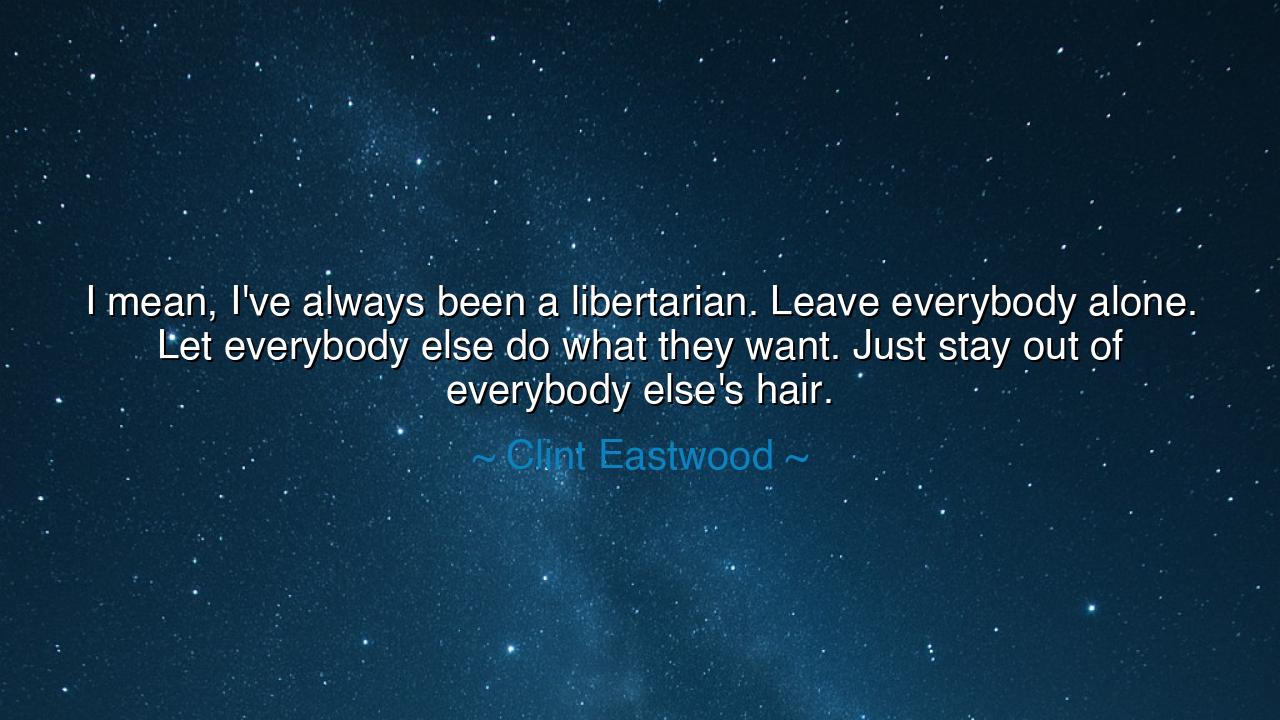
I mean, I've always been a libertarian. Leave everybody alone.
I mean, I've always been a libertarian. Leave everybody alone. Let everybody else do what they want. Just stay out of everybody else's hair.






“I mean, I've always been a libertarian. Leave everybody alone. Let everybody else do what they want. Just stay out of everybody else's hair.” — Clint Eastwood
These words, simple in form yet vast in spirit, carry the wisdom of a man who has seen much of the world and learned the quiet power of freedom. Clint Eastwood, a figure forged by the dust and silence of the frontier, speaks here as one who knows the sacred dignity of individual will. His statement, born not of rebellion but of restraint, echoes an ancient truth — that liberty is not chaos, but harmony born of respect. To leave others alone is not indifference; it is a recognition of their right to chart their own course beneath the same sky that shelters us all.
In every age, the greatest civilizations have risen when freedom was honored — when man trusted his neighbor to live by his own light, so long as that light harmed none. And in every age, tyranny has been born when one man sought to mold another’s soul, to command thought and desire as if they were his own. Eastwood’s creed — “Just stay out of everybody else’s hair” — is no idle jest. It is the distilled essence of what the ancients called natural law: the belief that each being, fashioned by the divine, must walk their path in peace, uncoerced and unbound.
Consider the example of Diogenes of Sinope, the philosopher who lived in a barrel. When Alexander the Great, in all his splendor, asked what gift he could bestow upon him, Diogenes replied, “Stand out of my sunlight.” In that moment, he embodied Eastwood’s wisdom across millennia — a man content to live by his own rule, asking only that others not obstruct his freedom. His happiness required no empire, no wealth, no interference — only space to be. It is a lesson as relevant in the crowded cities of today as it was under the sunlit skies of Greece.
Yet, the modern world has forgotten this ancient gentleness. We shout our opinions across the earth and demand that others bow to them. We seek to control the thoughts, speech, and choices of strangers — as though we were gods and they our clay. But Eastwood’s voice, calm and steady as a desert wind, reminds us that respect is the highest form of wisdom. To let others be is not weakness, but strength. It takes courage to allow difference, patience to allow freedom, and humility to admit that our way is not the only way.
This spirit of libertarianism, as Eastwood calls it, is not lawlessness but a sacred balance — the recognition that your liberty ends where another’s begins. The old American frontiersmen understood this instinctively: they lived by the creed of self-reliance, but also of mutual respect. Each man guarded his land, his voice, his honor — and left his neighbor to do the same. It was a harsh life, yet it birthed a rare kind of peace: the peace of knowing that no one sought to rule another.
The lesson, then, is simple yet profound: Honor the freedom of others as you honor your own. Do not meddle where you are not invited. Do not seek to control what you do not understand. Instead, build your life with honesty, courage, and tolerance. If others walk a path different from yours, bless them on their way. For every soul must climb its own mountain, and no man can reach enlightenment through another’s chain.
So, my child, remember this: liberty is not loud — it is quiet. It is the stillness of knowing you are free, and that others are too. To leave everyone alone is not to withdraw from life, but to give life space to flourish in all its forms. The wise do not seek to govern hearts — they seek to understand them. In doing so, they become what Eastwood has long been: steadfast, independent, and at peace in a world that often forgets how sacred it is to simply let each soul be.






AAdministratorAdministrator
Welcome, honored guests. Please leave a comment, we will respond soon